Por favor, use este identificador para citar o enlazar este ítem:
http://hdl.handle.net/10637/14156Sustainable higher education via telecollaboration improving plurilingual and pluricultural competence
| Título : | Sustainable higher education via telecollaboration improving plurilingual and pluricultural competence |
| Autor : | Polyakova, Oksana Galstyan-Sargsyan, Ruzana |
| Materias: | Instructional systems - Education (Higher); Educación - Métodos - Enseñanza universitaria.; Educación - Trabajo en equipo - Enseñanza universitaria.; Group work in education - Education (Higher); Spanish language - Study and teaching - Foreign speakers - Education (Higher); Conciencia lingüística.; Segunda lengua - Adquisición - Enseñanza universitaria.; Lengua española - Didáctica - Hablantes extranjeros - Enseñanza universitaria.; Second language acquisition - Education (Higher); Language awareness. |
| Editorial : | National Research Mordovia State University |
| Citación : | Polyakova, O. & Galstyan-Sargsyan, R. (2021). Sustainable higher education via telecollaboration improving plurilingual and pluricultural competence. Integration of Education, vol. 25, i. 4 (jun. 2021), pp. 544-561. DOI: https://doi.org/10.15507/1991-9468.105.025.202104.544-561 |
| Resumen : | Introduction. Due to globalisation, the modern workforce is significantly diversified. Therefore, there is a need to modernise and embrace innovation in 21st-century education to prepare international professionals to work in cross-cultural teams via digital platforms. While research in the recent past has primarily focused on the refinement of future expert competences in tertiary education, only a handful of studies have been done to establish how plurilingual and pluricultural competence can be digitally developed at the inter-university level. In this light, this study sought to bridge this gap in the research on the sustainable cooperation model. Materials and Methods. The design for the methodological plan of integrating plurilingualism and pluriculturalism in university teaching was premised on the need to promote networking among students from different universities and countries. Its major stages based on the Collaborative Online International Learning approach included three stages: find a partner, prepare the project and carry out the project. A virtual exchange experiment across two institutions of higher learning in Spain and Finland helped analyse plurilingual and pluricultural competence achievement by means of questionnaires. Results. A special Collaborative Online International Learning approach used to explore plurilingual and pluricultural competence and the effectiveness of online-assisted language interaction, teamwork or intercultural cooperation. The study’s findings confirmed that plurilingual and pluricultural competence among students could also be developed using virtual cooperation, thus supporting cost-effective options of sustainable university training. Discussion and Conclusion. The project had a positive impact on reaching sustainable education goals by highlighting intercultural interaction prospects. Besides, it displays real challenges such as different schedules, grading systems, timing, motivation or virtual interaction among learners and ways of overcoming them. Regardless of the fundamental idea of formative exploration, our study presents some findings that lecturers, language training practitioners and policymakers willing to apply telecollaboration will be deserving of thought. |
| Descripción : | Este artículo se encuentra disponible en la página web de la revista en la siguiente URL: https://edumag.mrsu.ru/content/pdf/21-4/01.pdf |
| URI : | http://hdl.handle.net/10637/14156 |
| Derechos: | http://creativecommons.org/licenses/by/4.0/deed.es |
| ISSN : | 1991-9468 2308-1058 (Electrónico) |
| Fecha de publicación : | 15-jun-2021 |
| Centro : | Universidad Cardenal Herrera-CEU |
| Aparece en las colecciones: | Dpto. Humanidades |
Los ítems de DSpace están protegidos por copyright, con todos los derechos reservados, a menos que se indique lo contrario.


